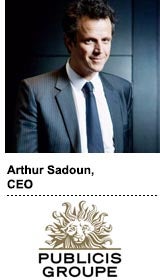Publicis reported Q3 earnings on a last-minute call with investors Thursday after results came in worse than expected, causing the holding company to lower its guidance through 2020.
Organic growth was down 2.7% to $2.86 billion in Q3, and down 1.4% to $7.6 billion in the first nine months of the year.
So Publicis lowered its outlook to -2.5% for 2019 and between -2 and 1% for 2020. In January, the holding company predicted stronger organic growth in 2019 vs. 2018, which clocked in at 0.8%.
Publicis was supposed to report earnings on Oct. 16, but moved the date up as soon as it finalized the numbers.
“Our quarterly numbers and forecasts did not deliver on expectations,” said Publicis CEO Arthur Sadoun. “We have dug deep to understand how the challenges we are facing could continue to impact our short-term organic growth and margin.”
Creative + Sapient = confusion
Publicis continues to suffer from client attrition on its creative business, where the struggling, fast-moving consumer goods and retail sectors make up 37% of revenue. But Publicis Media also underperformed in Q3, despite winning the GSK and FCA accounts, due to tougher comps against 2018.
“When our clients start to cut spend, they start with brand advertising,” Sadoun said.
Sapient continues to be a drag on the business, despite a $1.7 billion write-down in 2017. The offering is still not taking off in the United States, where two-thirds of its business operates. Publicis Sapient is moving away from one-off transformation projects related to marketing to cement stickier relationships with clients, a shift that is taking a hit on revenue as Publicis had to cut ties with a few clients in search of longer-term relationships.
Overall, Sapient’s domestic struggles along with attrition on the creative business cost Publicis about $220 million in Q3.
Publicis is leaving a wide range for its 2020 outlook because growth will depend on how quickly it can ramp up on business transformation projects at Sapient. While those projects are taking off slowly, they’re bringing in a higher margin than traditional creative and media work and will allow the group to keep improving margins year-over-year.
“We are bringing value and an offer that is different,” Sadoun said. “Some clients like it and are ready to pay the price for it. Some clients want to go the cheap way and we lose.”
Publicis expects client attrition to continue through 2020 and is betting that a slow-moving effort to push Sapient services into other agencies will get its creative business back to growth.
“Let us be clear: We are not giving up on our creative business,” Sadoun said. “The question is: How fast can we bring our agencies the digital services they need?”
The Epsilon in the room
Investors were curious about how Epsilon affected Publicis’ rocky quarter. The holding company bought the data firm for $4.4 billion in April, saddling it with $5.5 billion in debt.
Epsilon’s core business around first-party data management is “slightly growing,” Sadoun said, but he did not to break out figures for its declining creative agency and affiliate businesses. Publicis merged Epsilon’s creative agency with another creative agency to stem its decline and is still figuring out exactly what to do with CJ Affiliate after moving it inside of Publicis Media.
Sadoun ensured investors he is being “being fast and decisive on the operations that are not working” while focusing on growing the data business across its clients, which will be a boon for media.
While investors realize it’s early days for Epsilon, they are losing patience with Publicis’ slow and expensive transformation.
One investor noted that Publicis spent $11 billion on acquisitions in the past decade that have not yet materialized into organic growth. Another questioned why Omnicom, which hasn’t made a data acquisition, is the strongest performing holding company of the bunch.
Sadoun pointed to structural changes in the advertising industry that are funneling growth toward the major platforms and away from holding companies while maintaining that doubling down on business transformation is the way back to growth.
“It’s clear this is a transition that is penalizing our short-term growth, but [it’s doing so] for the better,” he said. “We are definitely at the hard part of our transformation.”














